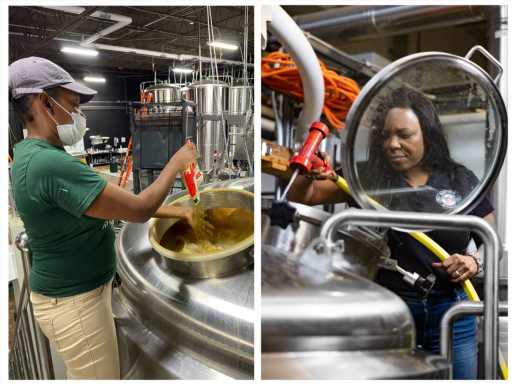GABF adds diversity in National Black Brewers Association Pavilion
Despite being a longtime beer drinker and brewery owner, Celeste Beatty has only attended the Great American Beer Festival once in its 40-plus-year history.
In 2001, she founded Harlem Brewing Co. and began contracting with other beer makers to bring her original recipes to market. Beer has been Beatty’s way of connecting with her heritage and community. As a Black woman, she looks to the Harlem Renaissance, the Sugar Hill district, and icons like baseball players Buck Leonard and Josh Gibson for inspiration in her craft.
Beatty has always wanted to share her beers – and the unique stories they honor – with drinkers at GABF, but was unsure if she’d fit in with the “big guys” who typically serve there. This year, however, Beatty jumped at the opportunity to pour on the festival floor after learning there would be an area dedicated to brewers of color.
Harlem Brewing Co. will be one of five booths in the first National Black Brewers Association Pavilion, which will inhabit 360 square feet of real estate within the Colorado Convention Center during the fest (Sept. 21-23). The activation aims to add diversity to GABF’s lineup of breweries and raise awareness about its namesake trade group, which formed in December.
Southern California-based Crowns & Hops, Connecticut’s Rhythm Brewing Co., Montclair Brewery out of New Jersey, and Marcus Baskerville of Weathered Souls Brewery in Texas, who launched the Black is Beautiful movement in 2020, will also have booths there.
Kevin Asato, executive director of the National Black Brewers Association (NB2A), said the idea to spotlight Black-owned breweries came from conversations with Bob Pease, president and CEO of the Brewers Association. Since NB2A is a nascent group, Asato wants to collaborate with the BA to uplift current entrepreneurs and bolster brewery ownership among people of color.
“Our tag is we’re bringing culture to the cup,” Asato said. “Our single mission is to improve the number of Black-owned breweries. In that, we’re also creating a community of Black brewers so they can effectively say, hey, where my people at?”
The pavilion is a welcome opportunity for Alisa Bowens-Mercado, owner and brewmaster at Rhythm Brewing Co., which will be serving at GABF for the first time. Drinkers will be able to try the flagship Rhythm unfiltered lager (5.5% ABV) and the Rhythm Blue unfiltered light lager (4.8%).
Another noteworthy pour in the pavilion: Black is Beautiful Vol. 2. Baskerville of Weathered Souls created the inaugural beer, a stout, in 2020 to spotlight racial injustices and police brutality following the murders of George Floyd in Minneapolis and Breonna Taylor in Louisville, Ky. More than 1,200 breweries across the globe recreated the recipe with the intent to donate proceeds from its sale to organizations dedicated to equality, inclusion and social justice reform.
Black is Beautiful Vol. 2 is a different style – a hazy India pale ale – with a similar mission. This time, brewers who participate pledge to donate $1 per beer to the NB2A. Two versions, one from Baskerville and another from Dogfish Head Brewery, will be available at GABF.
Bowens-Mercado, or Lady Lager as she’s known in beer circles, said she is ecstatic to see festival organizers embrace “real representation” on the festival floor.
“It’s historic,” she said. “I’m just happy to be alive to see it.”
Data about the craft beer industry underscores the need for a trade group that supports BIPOC brewers.
When the BA last surveyed a sample of its membership in 2021 to collect demographic information about craft brewery ownership, the vast majority of – 93.5% of respondents – identified as white. Three-quarters (75.6%) identified as male.
Comparatively, 2.2% of respondents identified as Hispanic or Latino/Latina, 2% identified as Asian, 0.4% identified as Black, and 0.4% identified as American Indian or Alaska Native.
While there are more than 500 breweries serving at GABF, the NB2A Pavilion boasts five booths. Of the more than 9,700 craft breweries in the U.S., about 100 are members of the NB2A.
“The simple math just seems baffling, it’s so freaking small,” he said. “There is a wild disparity – a wild, wild, wild disparity.”
Beyond the festival, NB2A’s board members are working on initiatives to help Black beer makers gain access to resources like mass manufacturing, production and distribution. Finding capital to open a brewery is among the industry’s biggest barriers to entry, Beatty said, noting that many BIPOC brewers have brands, but not brick-and-mortar establishments.
“You look at the impact of breweries, those gathering places are so important for communities. They’re also very important for BIPOC communities to have a place to not just have beer, but have events, activities, discussions, and support not-for-profits,” she said. “That’s an important part of craft brewing beyond beer itself.”
In August, NB2A worked with Sen. Steven Bradford of California to recognize Oct. 10 as National Black Brewers Day. Sacramento’s Oak Park Brewing Co., owned by NB2A founder, former mayor and basketball player Kevin Johnson, plans to host a festival on Oct. 12-15 to commemorate the occasion and celebrate Black brewers. The Peoples Beer Fest is a nod to Theodore Mack Sr., the country’s first African-American brewer who created Peoples Beer.
Beatty, who sits on the NB2A board, hopes that through the organization, craft brewers across the country will find creative ways to work together. For example, she hopes to see brewers move beyond collaboration beers into co-brewing facilities that are home to more than one company.
“There’s got to be some creative ways to find resources in a way where it’s not asking for a handout. I prefer to say it’s a hand up,” Beatty said.
One producer already offered NB2A a free brewing system. Beatty plans to install it in Harlem Brewing Co.’s forthcoming production facility in Rocky Mount, North Carolina. The brewery is being built in a former warehouse where in 1946 nearly 10,000 American-American tobacco workers in eastern North Carolina voted to unionize as part of a region-wide campaign called Operation Dixie.
Beatty, whose background is in international relations and mediation, expects more opportunities like that will come about from having a trade group and a spot at the country’s biggest craft beer gathering.
“I’m incredibly excited that we as NB2A are being afforded the opportunity to create this pavilion and to share our passions and to have a voice at the Great American Beer Festival,” she said.
Subscribe to our new food newsletter, Stuffed, to get Denver food and drink news sent straight to your inbox.
Source: Read Full Article




